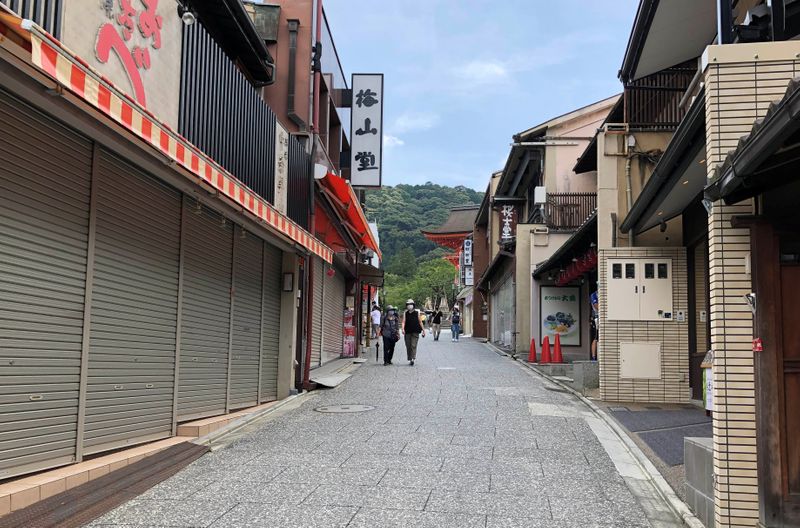By Leika Kihara and Takahiko Wada
KYOTO, Japan (Reuters) - It's peak summer holiday time in the ancient Japanese city of Kyoto, when throngs of international tourists would usually be flocking to its famous temples and spending up large in the city's hotels, restaurants and souvenir shops.
Instead, streets are empty, shops are closed and hotels are struggling to survive as the coronavirus pandemic shuts off the supply of visitors and ravages the economy.
"This is far worse than during the Lehman crisis," said an 80-year-old taxi driver, referring to the financial crash of 2008. "Some days I would earn just 2,000 yen ($20). I won't make any money once I buy lunch and pay my gas bill."
The plight of Kyoto and other cities in the western Kansai region has exposed the vulnerability of Prime Minister Shinzo Abe's strategy that sought to revive local economies with an influx of foreign tourists – among key pillars of his "Abenomics" stimulus policy.
Abe's administration set a target to lure 40 million overseas visitors per year and encouraged regional cities to open new ports, increase international flights and approve new hotel construction to accommodate the influx.
Cities such as Kyoto and nearby Osaka - whose manufacturers were being hit by intensifying competition with China - became reliant on tourists, making them victims of their own success.
Since the launch of Abenomics in late 2012, the number of overseas visitors rose steadily to exceed 30 million last year, triple the level in 2013.
Over 2.7 million visited Japan in January but as the country closed its borders to contain the virus, the flow trickled to a meagre 2,600 in June.
HOTELS HIT
Hardest hit are the hotels, which are suffering not just from a plunge in overseas visitors but shrinking domestic business travel as more companies shift to online meetings.
"The hotels, restaurants and souvenir shops expanded business, perhaps too much, since inbound tourism was bringing in so much money," said Nobuhiro Doi, president of major regional lender Bank of Kyoto.
Kyoto is now short of parking lots because many of them have been replaced with hotels during a construction boom in the past few years.
The city now has 664 hotels, up 25% from five years ago. The number of smaller guest houses spiked by nearly five-fold to 3,299, according to the city.
"We'll probably see more hotels go under," said Doi. "Things will never be the same."
Things are no better in nearby Osaka, a popular destination for its food culture and imposing castle.
The evaporation of tourism demand hit when the city's hotel supply was already in excess with available rooms surging to 90,000 this year, up 80% from five years ago.
Hotel Nikko Osaka, among the city's biggest luxury hotels, saw less than 20% of its rooms filled on average in July, down from over 90% before COVID-19 hit.
"I've never seen anything this bad and can't see how all these hotels in the area can survive," Hiroaki Gofuku, president of Hotel Nikko Osaka, told Reuters, adding his hotel was bleeding losses since the virus struck.
"There will be more bankruptcies and job losses. Things won't get better for another two to three years."
Osaka already saw 147 companies go under in June, exceeding Tokyo as the hardest hit area in Japan, with roughly another 100 likely to have followed in July, think tank Tokyo Shoko Research said.
Top government spokesman Yoshihide Suga conceded Japan's tourism industry had been hit hard, but said a $16 billion campaign launched in July to encourage domestic travel will help offset some of the pain.
"Local tourist destinations are in an extremely severe state," Suga told reporters last month. "By helping tourist and retail industries, we hope the campaign will pull companies out from their plight."
Yoshihiko Nitta, a researcher at Tokyo Shoko Research's Kansai branch, said government safety nets were keeping many companies alive.
"But things may change from around September, when immediate loans they took start to expire," he said. "If there's a huge second wave of infections, more businesses could go under including some of the big firms."

($1 = 105.6100 yen)